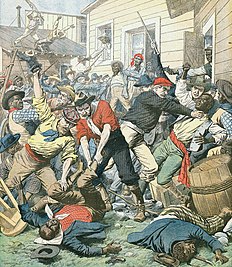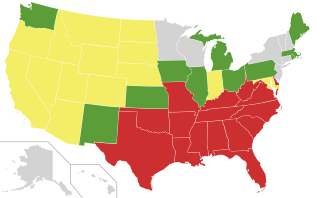
Back قوانين مكافحة تمازج الأجناس في الولايات المتحدة Arabic Lois contre le métissage aux États-Unis French חוקים נגד יחסי זוגיות בין-גזעיים בארצות הברית HE
| Part of a series on |
| Discrimination |
|---|
 |
| Part of a series on the |
| Nadir of American race relations |
|---|
 |

In the United States, many U.S. states historically had anti-miscegenation laws which prohibited interracial marriage and, in some states, interracial sexual relations. Some of these laws predated the establishment of the United States, and some dated to the later 17th or early 18th century, a century or more after the complete racialization of slavery.[1] Nine states never enacted anti-miscegenation laws, and 25 states had repealed their laws by 1967. In that year, the U.S. Supreme Court ruled in Loving v. Virginia that such laws are unconstitutional under the Fourteenth Amendment to the U.S. Constitution.[2][3]
The term miscegenation was first used in 1863, during the American Civil War, by journalists to discredit the abolitionist movement by stirring up debate over the prospect of interracial marriage after the abolition of slavery.[4]
Typically defining mixed-race marriages or sexual relations as a felony, these laws also prohibited the issuance of marriage licenses and the solemnization of weddings between mixed-race couples and prohibited the officiation of such ceremonies. Sometimes, the individuals attempting to marry would not be held guilty of miscegenation itself, but felony charges of adultery or fornication would be brought against them instead. All anti-miscegenation laws banned marriage between whites and non-white groups, primarily black people, but often also Native Americans and Asian Americans.[5]
In many states, anti-miscegenation laws also criminalized cohabitation and sex between whites and non-whites. In addition, Oklahoma in 1908 banned marriage "between a person of African descent" and "any person not of African descent"; Louisiana in 1920 banned marriage between Native Americans and African Americans (and from 1920 to 1942, concubinage as well); and Maryland in 1935 banned marriages between black people and Filipinos.[6] While anti-miscegenation laws are often regarded as a Southern phenomenon, most states of the Western United States and the Great Plains also enacted them.
Although anti-miscegenation amendments were proposed in the United States Congress in 1871, 1912–1913, and 1928,[7][8] a nationwide law against mixed-race marriages was never enacted. Prior to the California Supreme Court's ruling in Perez v. Sharp (1948), no court in the United States had ever struck down a ban on interracial marriage. In 1967, the United States Supreme Court (the Warren Court) unanimously ruled in Loving v. Virginia that anti-miscegenation laws are unconstitutional. After Loving, the remaining state anti-miscegenation laws were repealed; the last state to repeal its laws against interracial marriage was Alabama in 2000.
- ^ Woodson, Carter G. (1918), "The Beginnings of the Miscegenation of the Whites and Blacks", The Journal of Negro History, 3 (4): 335–353, doi:10.2307/2713814, JSTOR 2713814
- ^ "Loving v. Virginia". Oyez. Archived from the original on 2019-05-11. Retrieved 2019-10-03.
- ^ "Loving v. Virginia". LII / Legal Information Institute. Archived from the original on 2019-10-15. Retrieved 2019-10-03.
- ^ Fredrickson, George M. (1987), The Black Image in the White Mind, Wesleyan University Press, p. 172, ISBN 0-8195-6188-6
- ^ Karthikeyan, Hrishi; Chin, Gabriel Jackson (2011-04-14). "Preserving Racial Identity: Population Patterns and the Application of Anti-Miscegenation Statutes to Asian Americans, 1910-1950". SSRN 283998.
{{cite journal}}: Cite journal requires|journal=(help) - ^ Martin, Byron Curti, Racism in the United States: A History of the Anti-Miscegenation Legislation and Litigation, pp. 1026, 1033–4, 1062–3, 1136–7 (See version Archived 2019-04-20 at the Wayback Machine of article in the USC Digital collection)
- ^ Courtroom History, Loving Day, archived from the original on 31 December 2007, retrieved 2008-01-02
- ^ Edward Stein (2004), Past and Present Proposed Amendments to the United States Constitution regarding marriage (PDF), vol. 82, Washing State University Law Quarterly, archived from the original (PDF) on 2007-12-01, retrieved 2008-01-04, archived from the original Archived March 7, 2008, at the Wayback Machine on 2006-08-12.
© MMXXIII Rich X Search. We shall prevail. All rights reserved. Rich X Search
